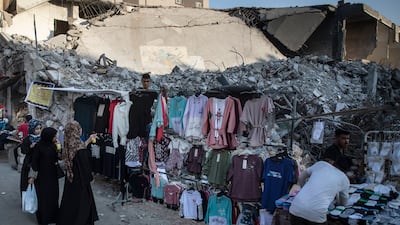After being unable to celebrate Eid Al Fitr because of the 11-day war with Israel in May, residents of the Gaza Strip are marking Eid Al Adha while still struggling to recover from the effects of that conflict.
Heavy Israeli bombardment in response to rockets fired by Gaza militants destroyed thousands of homes in the Palestinian territory. More than 248 people lost their lives, including 66 children, and more than 1,900 were wounded, according to Gaza’s health ministry. Israel said one soldier and 12 civilians, including two children, died as result of the rocket fire.
“Despite the bad economic situation in Gaza, we want to make our children feel happy and we want to compensate for the difficult days they spent during the last escalation,” said Umm Mohammed Ismail, 45, as she looked for a new outfit for her daughter at a children’s store in Gaza city.
Gaza authorities declared a five-day holiday from Monday for Eid Al Adha.

Although a truce since May 21 has largely held, recovery in Gaza has been slow because of Israeli controls on goods entering the territory. After initially allowing only food and medical supplies through the Kerem Shalom border crossing, Israel last week began to allow most goods into Gaza apart from construction material and electrical goods.
Mustafa Mohammed, the owner of a clothes shop, said he was waiting for a shipment of clothes he had ordered from Turkey and worried about losing business this Eid as well.
“The situation is critical and our business is at risk,” Mr Mohammed told The National.
“Last Eid there was a war, and I was afraid of not being able to bring a new collection this Eid because of the border closure.”
Gaza’s economy has suffered under a blockade imposed by Israel after the militant group Hamas took control of the enclave in 2007. Unemployment is high and infrastructure has been battered by Israeli bombardment during several rounds of fighting since 2008.
Mr Mohammed and other traders said they were disappointed by Israel’s decision to block Qatar’s cash assistance to Gaza after the latest fighting. The monthly payments of about $10 million go towards helping families in need.
The one business sector that is booming is the sale of livestock to sacrifice for Eid, said Hassan Azzam, general director of veterinary services at Gaza’s agriculture ministry.
Mr Azzam said sales of animals were up by about 50 per cent from last year. He said the increase was because of a boost in funding from NGOs operating in Gaza after the recent war .
“There is a huge market for livestock this year despite the bad economic situation in Gaza,” Jameel Ikraiem, a livestock trader, told The National.
“There is a slight rise in prices because the cost of animal feed went up. There is a shortage because of the [import] restrictions imposed by Israeli authorities,” Mr Ikraiem said.
Another factor was the difficulty in importing animals from Egypt, on Gaza's southern border, because of strict specifications, he said.
Along with buying new clothes and the sacrifice of an animal, another Eid Al Adha tradition is to visit or host relatives and friends.
For Gazans such as Hussain Abu Silmiya, entertaining guests is a problem.
The owner of an accounting firm, Mr Abu Silmiya lives with his wife and four children in one room on the ground floor of his house, in the Shati refugee camp, after the top storey was destroyed by Israeli bombs in the recent conflict.
“We wait for Eid each year because it is an occasion to bring people together, but now I am wondering how I will welcome guests in my home,” Mr Abu Silmiya told The National.
Thousands of other families are in the same situation. According to the UN’s Office for the Co-ordination of Humanitarian Affairs, nearly 17,000 residential and commercial structures were damaged or destroyed during the fighting in May.
“I was supposed to receive compensation to rebuild my home, but until now I haven't received anything,” Mr Abu Silmiya said, referring to assistance from a reconstruction committee set up by Gaza's Hamas rulers after the conflict.
He said he would need about $50,000 to rebuild his home. “Even if I want to rebuild it myself, which will be difficult because I don’t have this amount of money, there is no construction material, and if it is available, it is so expensive."

